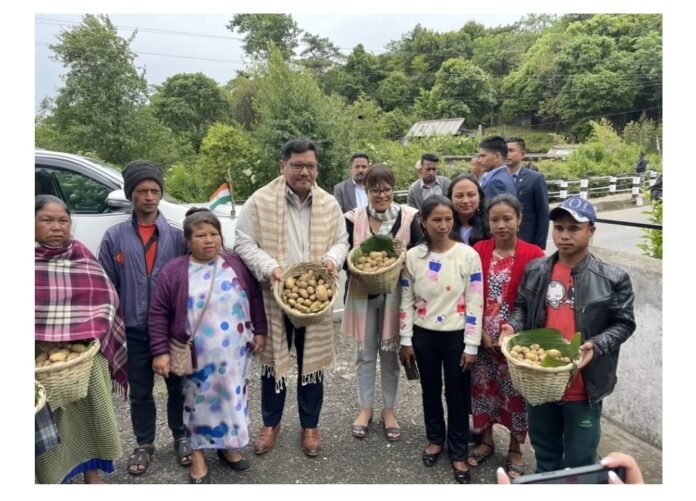Meghalaya’s Chief Minister, Conrad K Sangma, along with Agricultural Minister Ampareen Lyngdob, recently paid a visit to the Bio Resources Development Centre (BRDC) in Upper Shillong. Their objective was to inspect the ongoing potato seed production programme, with a focus on promoting scientific methods and improving the quality of potato produce in the region. This article highlights the key discussions and initiatives taken during the visit to enhance potato cultivation and strengthen the agricultural sector in Meghalaya.
During their visit, Chief Minister Conrad K Sangma and Agricultural Minister Ampareen Lyngdob emphasized the importance of adopting a scientific approach to potato production. They acknowledged that implementing scientific methods and techniques can significantly improve the quality and yield of potato crops, benefiting farmers and the overall agricultural sector. By incorporating scientific practices, farmers can enhance their agricultural practices, increase their income, and contribute to food security.
One of the key aspects discussed during the visit was the significance of soil and land preparation. The officials stressed the importance of conducting soil tests to assess nutrient content and pH levels, which would help determine the suitability of the land for potato cultivation. By obtaining this information, farmers can make informed decisions regarding fertilizers and soil amendments, ensuring optimal soil conditions for better crop growth and development.
Seed selection and quality were also highlighted as crucial factors for successful potato production. Chief Minister Conrad K Sangma and Agricultural Minister Ampareen Lyngdob emphasized the need for using high-quality, disease-free potato seeds with desirable traits. Certified seeds or techniques such as tissue culture were mentioned as effective methods to ensure healthy plant growth and higher yields. By emphasizing the importance of selecting quality seeds, the officials aim to improve crop productivity and contribute to the overall development of the agricultural sector.
During the visit, the importance of crop rotation practices and integrated pest management techniques was underscored. Chief Minister Conrad K Sangma and Agricultural Minister Ampareen Lyngdob highlighted the significance of minimizing the build-up of pests and diseases specific to potatoes. By implementing crop rotation and integrated pest management, farmers can reduce the reliance on chemical pesticides and promote environmentally friendly farming practices. These measures contribute to sustainable agriculture while ensuring the health and quality of the potato crops.
Efficient irrigation systems and water management were discussed as crucial aspects of potato cultivation. The visiting officials emphasized the significance of utilizing techniques like drip irrigation and sprinklers to optimize water usage, minimize wastage, and ensure adequate water supply to the crops. By adopting these methods, farmers can effectively manage water resources, enhance crop growth, and improve overall water efficiency in potato production.
he Chief Minister and Agricultural Minister stressed the importance of proper fertilization and nutrient management practices. They highlighted the value of soil and plant tissue testing to identify nutrient deficiencies, enabling farmers to apply fertilizers in the right quantities and at the appropriate times. By optimizing nutrient levels, farmers can enhance potato growth and productivity, leading to increased yields and improved crop quality.
Proper harvesting techniques and post-harvest storage methods were also discussed during the visit. Chief Minister Conrad K Sangma and Agricultural Minister Ampareen Lyngdob emphasized the need for careful handling, curing, and appropriate storage conditions to prevent sprouting, rot, and spoilage. By implementing these practices, farmers can


